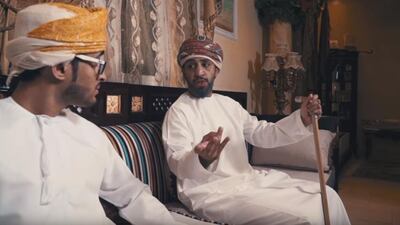An Omani cover of the raggaeton hit Despacito takes aim at the high cost of dowries and weddings that burden young couples.
In the video, a young man and his friends go to the house to ask her family for her hand in marriage. Dressed in their best mussar and khanjar, they are greeted by the girl’s father, who lays out the conditions: dowry, jewellery, house and car.
"Why?" asks the Omani singer Mohammed Al Mungi, reminding the family about marriage in simpler times, when men only needed to prepare their mussar turban, dishdasha and sandals and women could just put on their sheila, thobe dress and a mariah, a traditional pendant necklace. Today's brides are pressured to spend hundreds from their dowry on their dress and makeup.
The singer chastised people for chasing after money and frivolities while women sit at home, bored, “cooking potatoes” and falling in love with heroes on television.
“The hero falls in love, the hero dies, her hero is a fool,” raps Omani actor Muhannad Al Adwani. She breaks up her boredom by banging on a pot.
Groceries, petrol, and dowries are expensive. Al Adwani advises men to chill out and drink a papaya juice.
Keep the dowry “simple, simple”, Al Mungi urges the family.
A girl and a boy love each other. They get engaged and their parents agree. “See, it’s simple,” sings Al Mungi.
The parody is a cover of the single by Luis Fonsi and Daddy Yanki, which was popularised by a Justin Bieber remix in April.
The video has struck a chord with young Omanis who have suffered from the expectation of high dowries that can exceed 9,000 Omani rial. Omani men are forced to take out huge loans to pay for dowries, a bride’s jewellery and lavish wedding ceremonies with hundreds of guests. Additionally, men must show the family of a prospective bride that they are financially well off, with a good job, a good car and a furnished household that will be ready for the bride when they marry.
READ MORE - Oman students face bleak future with crippling academic loans
A marriage fund was introduced after 2011, when protestors had listed high marriage costs as a concern.
Young men start to save money for their weddings years before they have a prospect bride in mind, often working multiple jobs. Adding to the financial pressure, many students face loans of up to 20,000 rials (Dh191,000), despite generous government scholarships, and there is no guarantee of work after graduation.
For young couples struggling to start a life together, financial pressures can be a quick road to divorce.
As women and their families are expected to organise host large weddings, a growing number of young women are contributing to their dowries to help shoulder the burden.
“I was discussing this song with my husband yesterday and I don’t know why the boys or the men think that mahar is expensive,” said Amani Salam, an Arabic language teacher from Muscat who married in 2014. “Men always compare things with the old days, and it’s wrong to compare past with today.
“I said to my husband, 'in the old days the woman didn’t wear a white dress, she didn’t go to the salon to prepare herself, she didn’t have to book a hall and dinner'. The mahar it’s not actually for the woman, it’s for her to prepare for the whole wedding."
READ MORE - From South America to a dance floor near you: looking at the rise of reggaeton
It’s not only women who spend on weddings. The men in the video were dressed by Pride of Originality, a mussar company that helps grooms keep wedding costs low by offering rentals for a groom’s traditional wedding accessories like swords, khanjar daggars and bullet belts. A groom can easily spend 700 Omani rial (Dh6,678) on his wedding outfit and accessories.
“If people want to do a small wedding they still they will pay a lot and everything is expensive these days," said Ms Salam. "So that’s why marriage is expensive, not because the woman wants the money.”
Ms Salam's dowry was 9,000 Omani rials, to which she contributed. She had wanted a small wedding but at the request of her family, she had a banquet with 350 female guests.
The men kept it simple.

